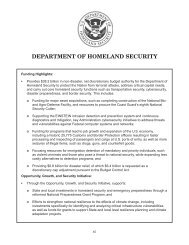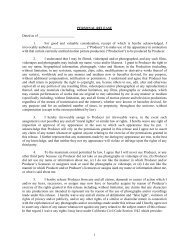A-HRC-13-42
You also want an ePaper? Increase the reach of your titles
YUMPU automatically turns print PDFs into web optimized ePapers that Google loves.
A/<strong>HRC</strong>/<strong>13</strong>/<strong>42</strong><br />
page 4<br />
legally regulated detention system; (d) holds a person for a short time in secret detention before<br />
handing them over to another State where that person will be put in secret detention for a longer<br />
period; and (e) has failed to take measures to identify persons or airplanes that were passing<br />
through its airports or airspace after information of the CIA programme involving secret<br />
detention has already been revealed.<br />
The study subsequently highlights the fact that secret detention in connection with<br />
counter-terrorism policies remains a serious problem on a global scale, through the use of secret<br />
detention facilities similar to those described in the study; the declaration of a state of<br />
emergency, which allows prolonged secret detention; or forms of “administrative detention”,<br />
also allowing prolonged secret detention. The cases and situations referred to, while not<br />
exhaustive, serve the purpose of substantiating the existence of secret detention in all regions of<br />
the world within the confines of the definition presented earlier.<br />
In their conclusions, the experts reiterate that international law clearly prohibits secret<br />
detention, which violates a number of human rights and humanitarian law norms that may not be<br />
derogated from under any circumstances. If secret detention constitutes an enforced<br />
disappearance and is widely or systematically practiced, it may even amount to a crime against<br />
humanity. However, in spite of these unequivocal norms, the practice of secret detention in the<br />
context of countering terrorism is widespread and has been reinvigorated by the “global war on<br />
terror”. The evidence gathered by the experts clearly shows that many States, referring to<br />
concerns relating to national security - often perceived or presented as unprecedented<br />
emergencies or threats - resort to secret detention.<br />
Secret detention effectively takes detainees outside the legal framework and renders<br />
safeguards contained in international instruments meaningless, including, importantly, that of<br />
habeas corpus. The most disturbing consequence of secret detention is, as many of the experts’<br />
interlocutors pointed out, the complete arbitrariness of the situation, together with the uncertainty<br />
surrounding the duration of the secret detention, and the feeling that there is no way the<br />
individual can regain control of his or her life.<br />
States of emergency, armed conflicts and the fight against terrorism - often framed in<br />
vaguely defined legal provisions - constitute an “enabling environment” for secret detention. As<br />
in the past, extraordinary powers are today conferred on authorities, including armed forces, law<br />
enforcement bodies and/or intelligence agencies, under states of emergency or global war<br />
paradigms without, or with very restricted, control mechanisms by parliaments or judicial bodies.<br />
In many contexts, intelligence agencies operate in a legal vacuum with no law, or no<br />
publicly available law, governing their actions. Many times, although intelligence bodies are not<br />
authorized by legislation to detain persons, they do so, sometimes for prolonged periods. In such<br />
situations, oversight and accountability mechanisms are either absent or severely restricted, with<br />
limited powers and hence ineffective.<br />
Secret detention has relied on systems of trans-border (regional or global) cooperation; in<br />
many instances, foreign security forces indeed operate freely in the territory of other States. It<br />
also leads to the mutual exchange of intelligence information between States. A crucial element<br />
in international cooperation has been the transfer of alleged terrorists to other countries, where<br />
they may face a substantial risk of being subjected to torture and other cruel, inhuman and
















